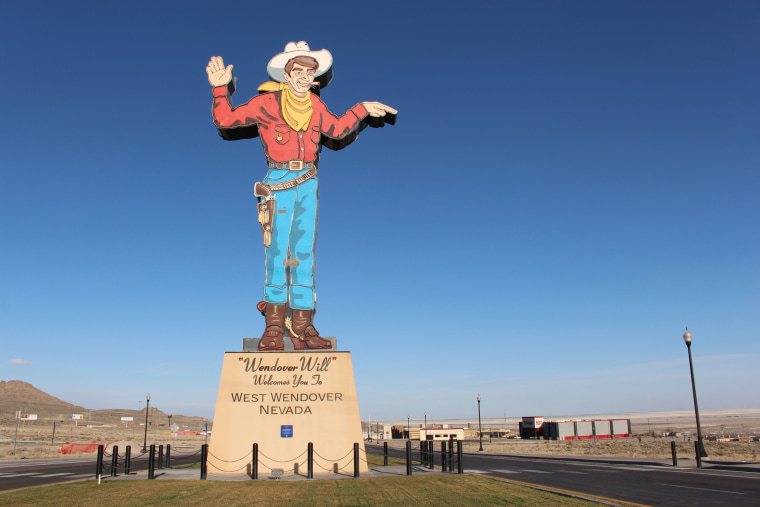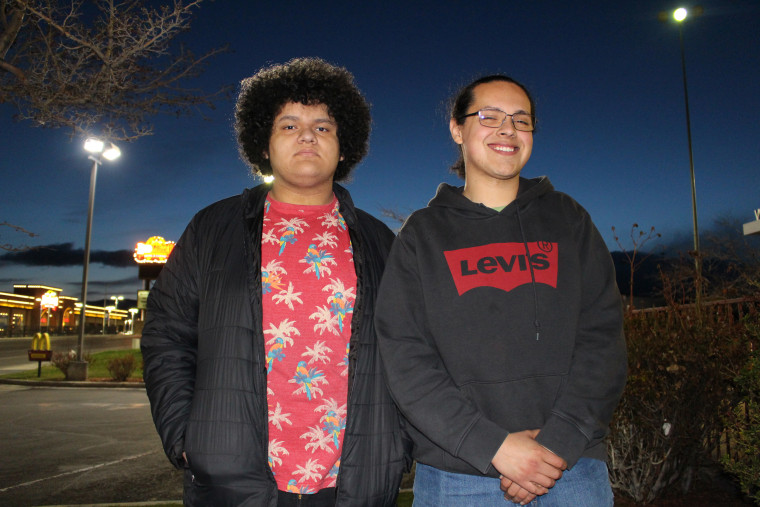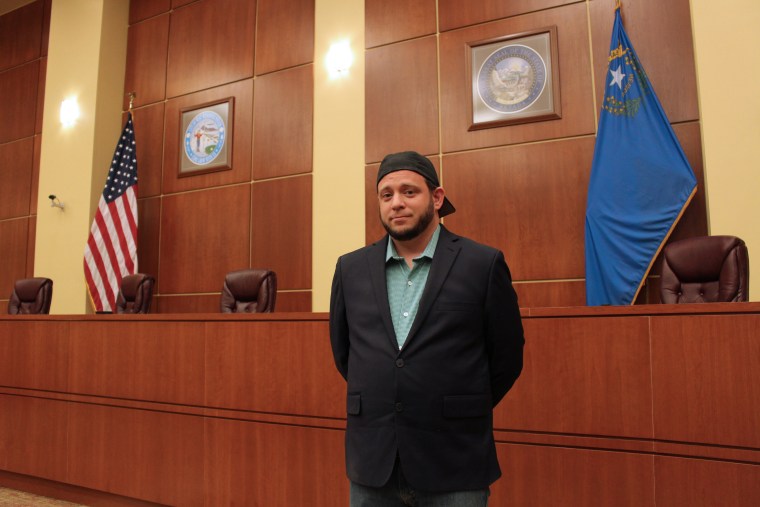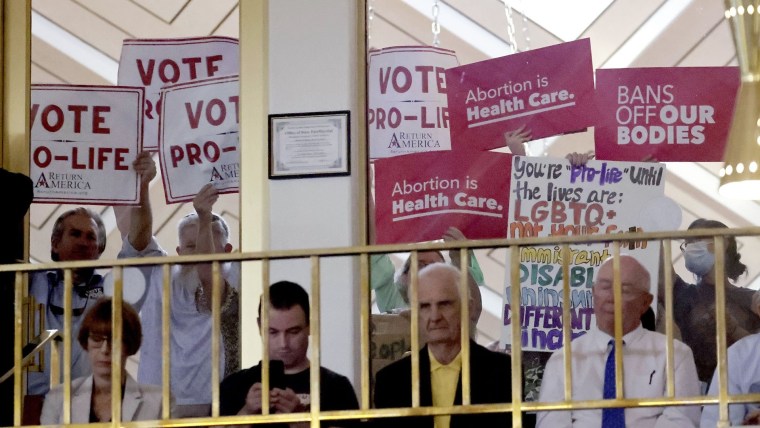WEST WENDOVER, Nev. — In April, Mark Lee Dickson arrived in this 4,500-person city that hugs the Utah-Nevada border to pitch an ordinance banning abortion.
Dickson is the director of the anti-abortion group Right to Life of East Texas and founder of another organization that has spent the last few years traveling the United States trying to convince local governments to pass abortion bans.
“Sixty-five cities and two counties across the United States” have passed similar restrictions, he told members of the West Wendover City Council during a mid-April meeting. The majority are in Texas, but recent successes in other states have buoyed Dickson and his group.
“We’re doing this in Virginia and Illinois and Montana and other places as well,” he said.
The quest to enact local bans has become particularly acute in small towns, like West Wendover and Hobbs, N.M., which are situated by borders between states that have restricted abortion and states where laws preserve access. They are crossroads where abortion advocates and providers have looked to establish clinics to serve people traveling from the large swaths of the U.S. where states have banned or severely restricted abortions after the U.S. Supreme Court overturned nearly 50-year-old nationwide abortion protections established by the court’s decision in Roe v. Wade.
Residents and leaders in West Wendover and many other towns and cities are grappling with the arrival of outside advocates, including Dickson, who now claim a stake in the governance of their small and otherwise quiet communities.
Dickson’s proposal to the West Wendover City Council came after council members voted against issuing a building permit to California-based Planned Parenthood Mar Monte in March. Officials from the Planned Parenthood affiliate told the local board the facility would offer primary care services in addition to abortion and other reproductive care. The vote followed hours of heated debate during public comment. Then, Mayor Jasie Holm vetoed the council’s decision, leaving the request for the permit in limbo.
Located in northeastern Nevada, West Wendover is more than 100 miles by car from Elko, the county seat, 120 miles west from Salt Lake City, and 170 miles south from Twin Falls, Idaho. The city has been a strategic location for casinos and a marijuana dispensary, which are legal in Nevada but restricted in Utah and Idaho. Similarly, its proximity to states that moved to restrict abortion access following the Dobbs decision overturning Roe has put a spotlight on the city.

Dickson’s anti-abortion proposal has drawn support from the town’s more conservative residents. But brothers Fernando and Marcos Cerros have challenged the anti-abortion efforts. In addition to wanting to protect and expand access to abortion, they both saw the primary care clinic that Planned Parenthood Mar Monte was seeking to establish as a potential victory in their rural community, which is designated a medically underserved area by the federal Health Resources and Services Administration.
Fernando Cerros, 22, said Planned Parenthood offered a solution to the area’s health care shortage “on a silver platter.”
“And it was denied. I need to do what I can do to get it here,” he said.
The Cerros brothers have tried to organize a group to support abortion access and establish the Planned Parenthood clinic in West Wendover, but have found it difficult to sustain. They said they feel outnumbered by residents who support Dickson. Marcos Cerros, 18, said he attends Catholic mass every Sunday in West Wendover and that parishioners there are regularly exposed to inflammatory anti-abortion language.
Abortion up to 24 weeks is protected in Nevada law and the state legislature recently approved a bill to enshrine the law in the state constitution. To become law, the measure will need to pass once more during Nevada’s next legislative session, in 2025, and be approved by voters in 2026.

Last year, following the Dobbs decision, then-Gov. Steve Sisolak, a Democrat, issued an executive order similar to ones in other states protecting patients who seek abortion care from facing prosecution by states where it is not legal.
Across Nevada’s eastern border, in Utah, abortion is legal up to 18 weeks while challenges to a trigger ban and a move to clamp down on abortion clinic licensure continue through the courts.
Idaho’s laws against abortion are among the most restrictive in the country. Currently, the state allows abortion only in certain cases of rape and incest or to save the mother’s life. In April, the state made headlines after lawmakers there passed an “abortion trafficking” law that criminalizes helping minors cross state borders to receive an abortion or obtain abortion pills without parental consent.
Extreme variations in abortion policy from state to state are the new normal, and local challenges are “what we’re in for,” said Rachel Rebouché, dean of the Beasley School of Law at Temple University and co-author of a recent research paper examining the post-Dobbs legal reality. “The theaters of conflict are multiplying, and this is the complex legal landscape that we live in.”
Dickson’s strategy in creating what he calls “sanctuary cities for the unborn” involves invoking a 150-year-old federal law that restricts the mailing of abortion pills. But Dickson argues the law goes further, banning any “paraphernalia,” including anything that could be used to perform an abortion, such as certain medical devices and tools.
Federal officials contend that although the abortion provision in the law has not been amended, previous court decisions have limited the reach of the Comstock Act. The Justice Department’s Office of Legal Counsel issued an opinion in December concluding that the law does not prohibit the mailing of abortion medication.
Dickson argues that the Comstock Act should supersede any state law or state constitutional protection. Rebouché said she’s unsure how it will shake out in the courts.
“There’s a number of jumps a court would have to take, the most significant of which would be that Comstock is still good law and it preempts abortion law,” she said. “That’s a controversial holding because Comstock has not been enforced or applied for decades.”
A spokesperson for Planned Parenthood Mar Monte declined to comment on whether the organization would continue to pursue the clinic in West Wendover, citing legal issues.
Dickson’s proposal now sits in the hands of the West Wendover City Council. He assured local leaders that, should they proceed with implementing the ordinance, his attorney will represent them at no cost. That attorney, Jonathan Mitchell, is a former solicitor general of Texas and is credited with helping shape the law that allows civil lawsuits against people and providers “aiding and abetting” pregnant women terminating a pregnancy.

An anti-abortion ordinance was walked back in at least one Ohio city, and other local bodies have voted against such ordinances or chosen not to put them to a vote, according to Dickson’s website.
Andrea Miller, president of the National Institute for Reproductive Health, said there’s an irony in Dickson’s multistate effort to stop people from crossing state lines for reproductive health care, including abortion.
“It would be laughable if it were not so tragic,” Miller said. “It’s an incredibly cynical, politically motivated effort largely aimed at sowing confusion and stigmatizing abortion care.”
Miller also pointed to other municipalities in the U.S. — urban centers like New York, Seattle, Philadelphia, and more — that have approved local ordinances protecting and expanding access to abortion care.
The West Wendover city manager, mayor, or council members would need to request that consideration of the proposal be added to a meeting agenda for it to move forward. Holm, the mayor, said she would not include the ordinance for consideration “at any time.” City Council member Gabriela Soriano, the only woman on the council, said in late April that she was unsure whether other council members would pursue the ordinance.
Holm said she was unaware of any outreach to the city from Planned Parenthood Mar Monte about moving forward with the clinic.
If the anti-abortion ordinance in West Wendover were instituted and prevented the opening of a clinic in the city, it would have far-reaching implications for residents. Currently, they face more than an hour drive in either direction to the nearest hospital.
For some community members, the decision isn’t so clear-cut.
The Cerros brothers said their mother, who is Catholic and Hispanic, is against abortion but in support of the Planned Parenthood clinic opening in West Wendover. Years ago, she had a miscarriage after driving an hour and a half to Salt Lake City for emergency care.
“There’s a big divide between people who think you’re killing babies versus people who think pregnancy is not black and white. Things come up,” Fernando Cerros said. “Sometimes you need emergency care. And a clinic like that would help.”
KFF Health News, formerly known as Kaiser Health News (KHN), is a national newsroom that produces in-depth journalism about health issues and is one of the core operating programs at KFF — the independent source for health policy research, polling, and journalism.
Follow NBC HEALTH on Twitter & Facebook.







